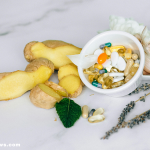
Your gut is more than just a digestive system. It’s home to trillions of microorganisms, collectively known as the microbiome. These tiny organisms affect nearly every part of your health, from digestion and immunity to mood and mental clarity. Gut health is quickly becoming a central topic in wellness discussions—and for good reason.
Many people struggle with bloating, fatigue, or unexplained mood swings. Often, these symptoms trace back to an imbalanced gut. Fortunately, small lifestyle changes can help restore gut balance and promote long-term health.
In this article, you’ll learn what gut health means, why the microbiome matters, and how to naturally support both.
What Is the Gut Microbiome?
The gut microbiome is a community of bacteria, viruses, and fungi living inside your digestive tract. While that may sound alarming, most of these microbes are friendly and necessary for good health. They help break down food, produce essential nutrients, and protect against harmful pathogens.
You might also like: Intermittent Fasting Guide: Benefits, Risks, and How to Start Safely
Each person has a unique microbiome, influenced by genetics, diet, environment, and lifestyle choices. A diverse microbiome is generally a sign of better health.

Why Gut Health Matters
A healthy gut helps you:
- Digest food efficiently
- Absorb vitamins and minerals
- Maintain a strong immune system
- Regulate mood and energy levels
Research also shows strong connections between the gut and the brain. This “gut-brain axis” means that gut imbalances can contribute to stress, anxiety, and even depression.
You might also like: How to Manage Stress for Better Sleep
Signs of an Unhealthy Gut
If your gut health is off balance, you may notice symptoms like:
- Bloating or gas
- Irregular bowel movements
- Food intolerances
- Skin breakouts
- Fatigue or brain fog
These signs often go untreated or are mistaken for unrelated issues. Paying attention to them is key to improving your wellbeing.
How to Improve Your Gut Health Naturally
You don’t need expensive supplements to improve your gut. Simple lifestyle changes can make a big difference:
1. Eat More Fiber
Fiber-rich foods feed good bacteria. Include whole grains, legumes, fruits, and vegetables in your meals.
2. Include Fermented Foods
Foods like yogurt, kefir, sauerkraut, and kimchi introduce helpful bacteria into your gut.
3. Stay Hydrated
Water helps maintain the lining of your gut and keeps digestion moving smoothly.
4. Reduce Sugar and Processed Foods
High sugar intake can lead to inflammation and feed harmful bacteria.
5. Manage Stress
Stress can disrupt gut balance. Try meditation, deep breathing, or light exercise to relax.
6. Get Enough Sleep
Poor sleep affects your gut microbiome. Aim for 7–9 hours of quality rest each night.
Probiotics vs. Prebiotics: What’s the Difference?
- Probiotics are live bacteria found in foods or supplements that add to your healthy gut flora.
- Prebiotics are types of fiber that feed the good bacteria already in your gut.
For best results, include both in your diet.
All in all
Your gut health affects your entire body—from digestion to mental health. By understanding the role of your microbiome and making small, mindful choices, you can support a healthy gut and feel better every day.
Start by adding fiber-rich and fermented foods, staying hydrated, and reducing stress. Your body and mind will thank you.
FAQs
Most people notice changes in digestion and energy within a few weeks of dietary and lifestyle changes.
Yes, research shows that imbalances in the microbiome may impact brain function and mood.
Generally, yes. However, people with compromised immune systems should consult a doctor before taking supplements.
Yogurt with live cultures, kimchi, sauerkraut, bananas, oats, and legumes are excellent choices.
Yes, antibiotics can wipe out both harmful and beneficial bacteria. Always follow up with probiotic-rich foods.








